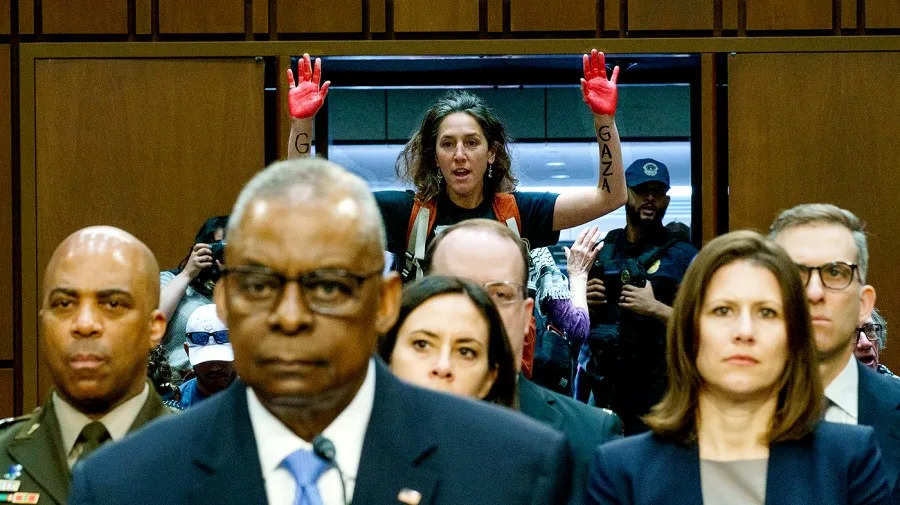Defense Secretary Lloyd Austin said Tuesday the U.S. has seen no evidence that Israel has committed genocide in its military operations against Hamas in Gaza.
"We don’t have any evidence of genocide being created," Austin said at a Senate Armed Services Committee hearing focused on President Joe Biden's latest budget request.

Asked by Sen. Tom Cotton, R-Ark., whether that means Israel is not committing genocide in Gaza, Austin said again, “We don’t have evidence of that.”
The assertion comes during a critical point in the Israel-Hamas war, in which many countries, including the U.S., have been critical of the way the Israel Defense Forces are conducting military operations in the Gaza Strip. According to the Hamas-run Gaza of Health Ministry, more than 33,000 people have died during the conflict and more than 75,000 have been injured.
Earlier in the hearing, Sen. Roger Wicker, R-Miss., had asked Austin whether Hamas’ attack on Israel on Oct. 7 should be considered an act of genocide.
“What we witnessed on Oct. 7, senator, was a horrific terrorist attack by Hamas,” Austin said, adding that it “certainly is a war crime.”
Israel has faced accusations for months that it has been committing genocide in Gaza. In January, the Israeli government defended itself before the United Nations’ top court, the International Court of Justice, in a case brought by South Africa. Lawyers for South Africa argued Israel had violated the 1948 Genocide Convention — the first human rights treaty adopted by the U.N. General Assembly in the wake of the Holocaust.
The court's judges ruled that there is a case to be heard regarding genocide, and while that legal process unfolds, they ordered Israel to take all measures to prevent acts of genocide against Palestinians. The court, however, has no power to enforce its rulings.
Austin testified Tuesday during a potential turning point in the war as the U.S. tries to influence Israel's strategy in Gaza to further minimize civilian casualties. Last week, Biden warned in a phone call with Israeli Prime Minister Benjamin Netanyahu that the U.S. policy toward its longtime ally could shift if Israel didn't change course in Gaza.
Hours later, Israel agreed to open additional aid routes to allow more humanitarian assistance to enter Gaza.
Israel killed a convoy of aid workers from World Central Kitchen in a military strike in Gaza early last week.
On Sunday, Israel’s military announced it was withdrawing troops from southern Gaza, although it is unclear whether the move represented a change in its offensive operations.
U.S. officials have been pushing for a cease-fire between Israel and Hamas, but negotiations have not yet been successful.
During the hearing Tuesday, Wicker had asked Austin whether Hamas would stop its aggression toward Israel if the country laid down its arms today.
"I seriously doubt that," Austin said.
Gaza protesters repeatedly interrupt Senate hearing with Pentagon leaders
Protesters demonstrating against the war in Gaza repeatedly interrupted a Tuesday Senate hearing attended by Defense Secretary Lloyd Austin and Joint Chiefs of Staff Chair Gen. Charles Brown.
The protesters interrupted the Senate Armed Services Committee hearing on Capitol Hill twice, demanding the U.S. “stop funding Israel” and supporting a “genocide” in Gaza, where Israel is fighting a major war against Hamas.
The group made it into the hearing room while Austin was delivering his opening remarks on the Pentagon’s 2025 budget request, forcing the committee to pause while police removed them from the room.
“Stop killing my people,” one demonstrator said. “Stop funding Israel.”
Several protesters began chanting to “stop the genocide in Gaza,” and at least one person said the U.S. should try to work on addressing issues like health care and climate change instead of sending money to Israel.
Sen. Jack Reed (D-R.I.), chair of the Senate Armed Services Committee, scolded protesters for interrupting the hearing.
“It is not appropriate for comments or demonstrations by the spectating audience here,” he said. “We are conducting a hearing, and we will do so.”
Israel launched the war in Gaza after Hamas fighters invaded southern Israel on Oct. 7, killing some 1,200 people and taking another roughly 240 hostages, with 100 still left alive and believed to be held by the Palestinian militant group.
Sen. Tom Cotton (R-Ark.) asked Austin later in the hearing if he agreed with the protesters that Israel was committing genocide in Gaza.
“We don’t have any evidence of genocide,” Austin replied. “I would remind everybody that what happened on Oct. 7 was absolutely horrible.”
Gaza protesters have interrupted several hearings on Capitol Hill previously and have appeared at events and speeches featuring President Biden.
Biden signaled some agreement last month during an event in North Carolina where he said the protesters “have a point” and there needs to be more aid in Gaza.
The Biden administration has grown increasingly concerned about the toll of the six-month war in Gaza, where more than 33,000 Palestinians have died. The president has tried to get more humanitarian aid into the strip and has urged Israel to minimize casualties, but he has also continued to send bombs and weapons to Israeli forces.
Biden faces a threat from his left in the November elections, as progressives, young voters and Arab Americans have already submitted protest votes at the primary ballot boxes over the Israel-Hamas war.
Austin said during the hearing that Israel must address the spiraling humanitarian situation in Gaza in a “meaningful way,” though he noted there was progress made when Israeli officials last week announced the opening of a new humanitarian border crossing in northern Gaza.
He also said the U.S. military is airdropping aid into Gaza and is working to construct a maritime port off the coast of the Strip. Austin added the initial operation capability of the pier should be completed by the third weekend of April.
The Pentagon chief stressed the best way for Israel to ensure peace in the region is to alleviate the crisis in Gaza.
“If they want to create a lasting effect in terms of stability,” Austin said of Israel, “then I think that something needs to be done … to help the Palestinian people.”
Austin tells Congress Israel is taking steps to boost aid to Gaza as lawmakers question US support
Defense Secretary Lloyd Austin told Congress Tuesday that pressure on Israel to improve humanitarian aid to Gaza appears to be working, but he said more must be done, and it remains to be seen if the improvement will continue.
“It clearly had an effect. We have seen changes in behavior, and we have seen more humanitarian assistance being pushed into Gaza,” Austin said in a Senate Armed Services Committee hearing. “Hopefully that trend will continue.”
Austin’s comments came during a session that was interrupted several times by protesters shouting at him to stop sending weapons to Israel. “Stop the genocide,” they said, as they lifted their hands, stained in red, in the air. A number of senators also decried the civilian casualties, saying the administration needs to do more to press Israel to protect the population in Gaza.
In response, Austin said he spoke with his Israeli counterpart, Defense Minister Yoav Gallant, on Monday and that he repeated U.S. insistence that Israel must move civilians out of the battlespace in Gaza and properly care for them.
Austin and Joint Chiefs Chairman Gen. CQ Brown Jr. were testifying on Capitol Hill about the Pentagon’s $850 billion budget for 2025. But the hearing offered the first chance for lawmakers on both sides to question the Pentagon’s top civilian and military leadership on the administration’s Israel strategy following Tel Aviv’s deadly strike on World Central Kitchen humanitarian aid workers in Gaza.
That strike led to a shift in tone from President Joe Biden on how Israel must protect civilian life in Gaza and drove dozens of House Democrats, including former House Speaker Nancy Pelosi, to call on Biden to halt weapons transfers to Israel. Half the population of Gaza is starving and on the brink of famine due to Israel’s tight restrictions on allowing aid trucks through.
Israel in recent days took initial steps to increase the flow of humanitarian aid into Gaza. In a call Friday, Biden told Israeli Prime Minister Benjamin Netanyahu that future U.S. support for the war in Gaza depends on Israel taking more action to protect civilians and aid workers.
At the hearing, Austin also said that the military is moving ahead with plans to build a pier off the Gaza coast to increase the delivery of humanitarian aid, and initial operations will probably be ready to start by the third week of this month. He said that details are still being worked out but that aid organizations will help do that.
Six U.S. military ships with personnel and components to build a humanitarian aid pier are enroute to Gaza, with several in the Mediterranean Sea, heading toward Cyprus.
The war, now in its seventh month, has killed more than 33,000 Palestinians, mostly women and children, according to local health authorities. Israeli authorities say 1,200 people, mostly civilians, were killed and roughly 250 people taken hostage in Hamas’ Oct. 7 attack.
In their opening statements, both Austin and Brown emphasized that their 2025 budget is still shaped with the military’s long-term strategic goal in mind — to ready forces and weapons for a potential future conflict with China. About $100 billion of this year’s request is set aside for new space, nuclear weapons and cyber warfare systems the military says it must invest in now before Beijing’s capabilities surpass it.
But the conflicts in Ukraine and Israel are challenging a deeply-divided Congress and have resulted in months of delays in getting last year’s defense budget through, which was only passed by lawmakers a few weeks ago.
Ukraine’s president Volodymyr Zelenskyy has issued desperate pleas that if the U.S. does not help soon, Kyiv will lose the war to Russia.
The Pentagon scraped together about $300 million in ammunition to send to Kyiv in March but cannot send more without Congress’ support, and a separate $60 billion supplemental bill that would fund those efforts has been stalled for months.
“The price of U.S. leadership is real. But it is far lower than the price of U.S. abdication,” Austin told the senators.
If Kyiv falls, it could imperil Ukraine’s Baltic NATO member neighbors and potentially drag U.S. troops into a prolonged European war. If millions die in Gaza due to starvation, it could enrage Israel’s Arab neighbors and lead to a much wider, deadlier Middle East conflict — one that could also bring harm to U.S. troops and to U.S. relations in the region for decades.
Israel’s actions in Gaza have been used as a rallying cry by factions of Iranian-backed militant groups, including the Houthis in Yemen and Islamic Resistance groups across Iraq and Syria, to strike at U.S. interests. Three U.S. service members have already been killed as drone and missile attacks increased against U.S. bases in the region.
Lawmakers are also seeing demands at home. For months, a handful of its far-right members have kept Congress from approving additional money or weapons for Ukraine until domestic needs like curbing the crush of migrants at the southern U.S. border are addressed. Republican House Speaker Mike Johnson is already facing a call to oust him as speaker by Georgia Republican Rep. Marjorie Taylor Greene because Johnson is trying to work out a compromise that would move the Ukraine aid forward.
Mass famine in Gaza would ensure long conflict, US defense chief says
A deadly, mass famine in Gaza would likely accelerate violence and ensure a long-term conflict, U.S. Defense Secretary Lloyd Austin told a Senate hearing on Tuesday, even as he dismissed accusations that Israel was responsible for an unfolding genocide in the Palestinian enclave.
Six months into Israel's air and ground campaign in Gaza, triggered by Hamas' Oct. 7 attack on southern Israel, the devastated enclave faces the risk of widespread famine and disease with nearly all its inhabitants now homeless.
Aid agencies have complained that Israel is not ensuring enough access to food, medicine and other needed humanitarian supplies. The European Union foreign policy chief Josep Borrell has accused it of using starvation as a weapon of war.
Asked by a lawmaker what the impact would be from a deadly mass famine, Austin said: "It will accelerate violence, and it will have the effect of ensuring that there's a long-term conflict."
"It doesn't have to happen ... We should continue to do everything we can, and we are doing this, to encourage the Israelis to provide humanitarian assistance," Austin told the Senate Armed Services Committee.
Israel has said aid is moving into Gaza more quickly, but the amount is disputed and the United Nations says it remains much less than the bare minimum to meet humanitarian needs.
Austin said it remained to be seen if the increase in aid could be deepened and sustained.
He added that an Israeli failure to separate the Palestinian people from Palestinian Islamist group Hamas "would just create more terrorism." Still, Austin defended Israel against accusations that it was carrying out a genocide in Gaza.
"We don't have evidence of that," Austin said.
In a call last week with Israeli Prime Minister Benjamin Netanyahu, U.S. President Joe Biden threatened to condition U.S. support for Israel's offensive in Gaza on its taking concrete steps to protect aid workers and civilians.
It was the first time that Biden, a Democrat and a staunch supporter of Israel, has sought to leverage U.S. aid to influence Israeli military behavior.
The president has come under enormous pressure from within his Democratic party to do more to address the humanitarian catastrophe for Palestinian civilians from Israeli attacks.
Representative Nancy Pelosi, former House speaker and a key ally of Biden, signed a letter on Friday from dozens of congressional Democrats urging a halt to weapons transfers to Israel.
Warren predicts ICJ will find Israel committed genocide in Gaza
Sen. Elizabeth Warren (D-Mass.) recently suggested international offices could find Israel’s bombardment of Gaza constitutes as genocide in the enclave.
The Massachusetts Democrat was delivering remarks last Friday at the Islamic Center of Boston in Wayland, Mass. when an audience member asked for her opinion on the International Court of Justice (ICJ) January ruling that found it is “plausible” that Israel is committing genocide in its war with Hamas in Gaza.
“So I think… that what’s happening now is there’s going to be a long and involved debate over what constitutes genocide, when you ask a legal question. For me, it is far more important to say what Israel is doing is wrong. And it is wrong,” per her spokesperson.
Further pressed on if Israel is committing genocide, she said, “If you want to do it as an application of law, I believe that they’ll find that it is genocide, and they have ample evidence to do so.”
Warren’s comments were originally videotaped and posted to X by a GBH News reporter and were later confirmed by her office to The Hill.
“Senator Warren believes that Prime Minister Netanyahu and his right-wing war cabinet have created a massive humanitarian disaster in Gaza and have not taken reasonable steps to protect civilians,” Warren’s spokesperson told The Hill.
The ICJ, the top United Nations judicial body, ruled in January that Israel must do more to protect civilians in the Gaza Strip but did not issue an order demanding a cease-fire in the strip.
More than 33,000 Palestinians have died in Gaza since early October, when Palestinian militant group Hamas launched a surprise assault on Israel, killing about 1,200 people and capturing about 250 others.
During her remarks, Warren said people need to think “past a labels argument.”
“For me, it is far more important to say what Israel is doing is wrong. And it is wrong. It is wrong to starve children within a civilian population in order to try to bend to your will, it is wrong to drop 2000-pound bombs, in densely populated civilian areas,” she said. “I think I can make a more effective argument by describing the behavior that is happening.”
Warren has recently ramped up her criticism of Israeli Prime Minister Benjamin Netanyahu and Israel’s wartime campaign and said last week she would move to block the sale of F-15s to Israel after six aid workers and their driver were killed in an Israeli airstrike in Gaza.
“Genocide”: Elizabeth Warren Sounds Alarm About the War in Gaza
Senator Elizabeth Warren is warning that Israel’s devastating military campaign in Gaza, which has killed more than 33,000 people, could legally be considered a genocide.
Warren made the comments during an event last week at a Boston-area mosque. Video of her speech began circulating on social media on Monday. The death toll in Gaza, which includes at least 13,000 children, is considered a low estimate due to the difficulty in counting the dead.
“If you want to do it as an application of law, I believe that they’ll find that it is genocide, and they have ample evidence to do so,” Warren said, speaking at the Islamic Center of Boston in Wayland, Massachusetts. She was responding to an audience question about the International Court of Justice ruling that it was “plausible” Israel has committed acts of genocide in Gaza.
Warren noted that, for her, “it is far more important to say what Israel is doing is wrong. And it is wrong.”
“It is wrong to starve children within a civilian population in order to try to bend to your will. It is wrong to drop 2,000-pound bombs, in densely populated civilian areas,” she said.
Warren faced criticism for her stance on the war when she backed Israel after Hamas’s October 7 attacks. As Israel’s war ramped up, along with international criticism of its actions, protesters have shown up outside of Warren’s offices, as well as her home. One Palestinian American even confronted Warren at a restaurant in Cambridge, Massachusetts, in November. Warren also voted to send more military aid to Israel in February, part of a bill that defunded the U.N. Relief and Works Agency for Palestine Refugees.
Warren’s new stance is the latest example of Democrats criticizing Israel’s actions. On March 22, Representative Alexandria Ocasio Cortez warned that the United States was complicit in the humanitarian crisis in the territory, and on March 15, Senator Chuck Schumer gave a speech criticizing Israeli Prime Minister Benjamin Netanyahu’s conduct in Gaza.
Warren was also among eight Democratic senators who called on President Joe Biden in an open letter in March to suspend military aid to Israel while it blocked U.S. humanitarian aid to Gaza.
More recently, the White House had to cancel its annual iftar banquet with American Muslim leaders last week after invitations were rejected in protest of America’s Israel military campaign. On Monday, the Foreign Press Association issued a statement urging international journalists to be allowed unfettered access into Gaza, which Israel’s government continues to block.





